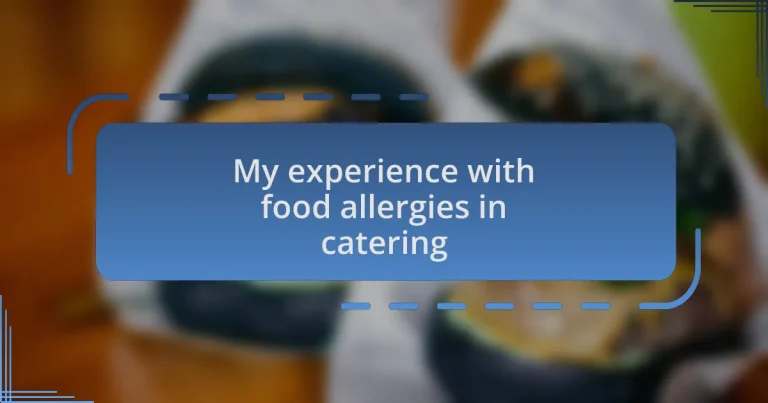Key takeaways:
- Food allergies are serious and require clear communication and labeling to ensure safety in catering environments.
- Proactive management of food allergies involves creating inclusive options and maintaining a dialogue with guests about their dietary needs.
- Training staff on allergen awareness and establishing cross-contamination protocols are crucial for safeguarding guest health and enhancing their dining experience.
Author: Olivia Hartwell
Bio: Olivia Hartwell is a contemporary fiction author known for her compelling narratives and vivid characterizations. With a background in literature and creative writing, she has a keen eye for detail and a passion for exploring the complexities of human relationships. Olivia’s debut novel, Whispers of the Heart, received critical acclaim and was nominated for several literary awards. When she’s not writing, she enjoys hiking in the mountains of Colorado and sipping artisanal coffee at local cafes. Olivia resides in Denver with her beloved rescue dog, Rosie.
Understanding food allergies
Food allergies are serious and often misunderstood. From my experience, the moment I discovered a guest had a severe nut allergy, it became clear just how critical understanding these allergies is. It made me wonder, how many others are navigating similar challenges without the right information or support?
The thing about food allergies is that they vary widely from person to person. I remember a cookout where a simple miscommunication led to an unexpected reaction. One guest, who was allergic to shellfish, nearly missed out on the fun because I hadn’t clearly labeled the dishes. It struck me then; labeling isn’t just a precaution—it’s essential for a safe dining experience.
It’s easy to dismiss food allergies as just another dietary restriction, but they’re often life-threatening. I know this first-hand; I once witnessed the panic on a friend’s face when they realized a meal contained a forbidden ingredient. It’s a stark reminder of how crucial it is to take every allergy seriously, not just for our customers’ safety but to foster an inclusive culinary environment. Wouldn’t you agree that everyone deserves to enjoy food without fear?
Common food allergies in catering
Food allergies are surprisingly common in catering, with certain allergens like peanuts, tree nuts, dairy, and gluten frequently coming into play. I remember one busy event where a guest pointed out his gluten intolerance just minutes before serving. It made me realize how vital it is to not only have gluten-free options but also to ensure that cross-contamination doesn’t happen.
Another significant allergy often encountered is dairy. I can’t forget the time a child at a birthday party reacted to a cheese platter I’d unwittingly placed in reach. The look of despair on her parents’ faces highlighted how important it is to communicate clearly with clients about potential allergens. Every chef needs to be aware: just one slip in preparation can jeopardize a guest’s health, even when the dishes seem safe.
Then there are those with shellfish allergies, which can provoke a severe reaction. I once found myself explaining to a guest that our shrimp cocktail was prepared in a separate kitchen. It struck me how crucial such measures are; simply being informed and taking the right steps can mean the difference between a delightful evening and an emergency. How often do we stop to think about the safe dining experiences we can help create?
Managing food allergies in catering
Managing food allergies in catering requires meticulous attention and proactive communication. I once catered a wedding where a guest informed me last minute about their tree nut allergy. The moment I realized the potential risk, I felt a rush of urgency. I quickly reassured them by double-checking all ingredients, demonstrating that vigilance is essential in ensuring everyone’s safety.
Additionally, I’ve learned that it’s not just about offering alternatives; it’s about creating a culture of inclusivity. During a corporate catering event, a vegetarian client shared their food allergies, and I made a point to turn their favorite dish into an allergen-free version. The satisfaction on their face reminded me that thoughtful adjustments can create memorable experiences while respecting dietary needs.
I often ask, are we doing enough to make every guest feel accommodated? Reflecting on my experiences, I believe a pre-event allergen questionnaire can facilitate open dialogue and provide peace of mind for clients. In the world of catering, it’s these small changes that not only prevent potential emergencies but also help forge lasting connections with our clients.
Importance of allergen awareness
Awareness of allergens in the catering environment is not just a matter of compliance; it’s about empathy. I vividly remember a birthday party where a child had a severe dairy allergy. Watching the parents scrutinize every item on the table, I felt a mix of responsibility and determination to ensure their child enjoyed the celebration without worry. This experience reinforced for me how crucial it is to prioritize allergen awareness—it’s not merely about what we serve but about fostering a sense of safety for everyone involved.
The stakes become even higher when catering larger events. At a recent festival, I was responsible for overseeing multiple food stations, each with different cuisine types. I noticed how a simple miscommunication could lead to a potentially dangerous situation for someone with allergies. This taught me that clear labeling and cross-contamination protocols are vital in protecting guests and enhancing their overall experience. After all, how would you feel if you weren’t certain what was safe to eat at a gathering?
Ultimately, allergen awareness can significantly impact a client’s perception of our catering service. I once received heartfelt thanks from a couple after I took the time to understand and accommodate their guests’ allergies and preferences. It was a reminder that being attentive to these needs not only improves safety but also elevates the overall dining experience, making it memorable for everyone. Isn’t that what catering is all about?
Challenges faced in catering
There are unique challenges that come with catering, particularly when it involves accommodating food allergies. I recall an outdoor wedding where I had to balance the joy of celebration with the risk of allergens. One guest had a life-threatening nut allergy. The pressure to ensure that every dish was meticulously prepared, free from cross-contamination, was palpable. It wasn’t just about serving food; it was about safeguarding a life.
As I navigated the complexities of that event, I realized that guest communication plays a pivotal role. I found myself in constant dialogue with multiple guests to confirm their needs, which can be a daunting task amid the hustle of catering. Have you ever tried to juggle concerns from different people while maintaining a smile? It can be exhausting but is ultimately rewarding when everyone is satisfied.
Another unexpected hurdle I faced was ingredient sourcing. One morning, I received a last-minute update about a guest’s gluten intolerance. The pressure was on to find suitable substitutes quickly. I had to think creatively and resourcefully, often relying on trusted suppliers who understood the urgency. It was in these moments that I truly learned the value of building relationships in the catering world, ensuring that I could deliver a safe and enjoyable experience, every time.
Tips for safe catering practices
When catering events, clear labeling of each dish is crucial. I’ve found that providing detailed descriptions not only helps guests with allergies but also fosters an inclusive atmosphere. Have you ever noticed how a simple label can ease anxiety? One wedding I catered had a dedicated allergen-free section, which not only alleviated concerns but also sparked conversations among guests about dietary preferences.
Another vital practice is to establish and communicate strict cross-contamination protocols. I remember handling a large corporate event where gluten and dairy allergies were prevalent. I made it a point to segment kitchen areas and use color-coded utensils for allergen-free dishes. This attention to detail not only kept guests safe but also instilled confidence in my catering services. How reassuring is it for guests to know their safety is a top priority?
I can’t stress enough the importance of training staff on allergen awareness. During one summer festival, I observed the difference knowledgeable staff made when handling food for guests with allergies. They were not only cautious but also proactive in answering questions, helping to create a reassuring environment. Investing time in educating your team transforms them into dedicated advocates for guest safety, which ultimately reflects well on the entire catering operation.


